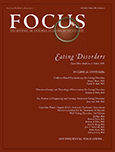Evidence-Based Psychotherapy for Eating Disorders
Abstract
Recommended psychotherapies for treating bulimia nervosa and binge eating disorder have been clearly established, with cognitive-behavioral therapy representing the leading choice. Second line psychotherapies for bulimia nervosa and binge eating disorder are interpersonal psychotherapy, as well as dialectical behavior therapy for bulimia nervosa and behavioral weight loss for binge eating disorder. An urgent need remains for effective and acceptable treatments for anorexia nervosa among adults with the choice of treatment currently informed by an array of psychotherapies with weak efficacy; trends toward high treatment drop out and poor adherence are important issues to resolve. Among children and adolescents with anorexia nervosa, and to some extent bulimia nervosa, family-based treatments that directly target eating are favored. Pharmacotherapy may also be recommended for some individuals with eating disorders, which would be administered by a primary care practitioner or psychiatrist for more severe, chronic cases or cases in which considerable psychiatric comorbidity is present. Treatment for eating disorders commonly involves a collaborative health care team that includes a psychotherapist and psychiatrist along with a primary care practitioner for regular monitoring of physical state.



